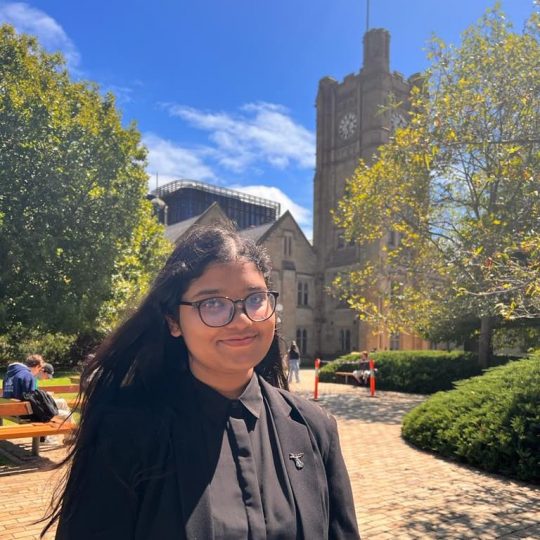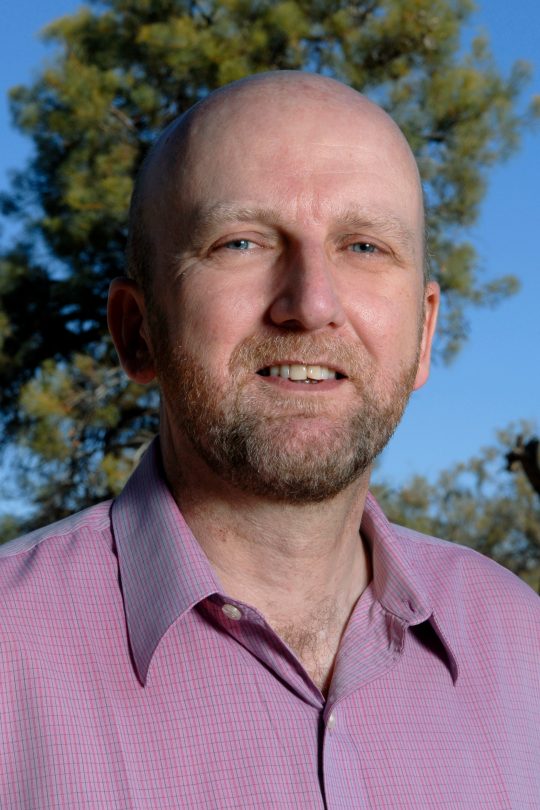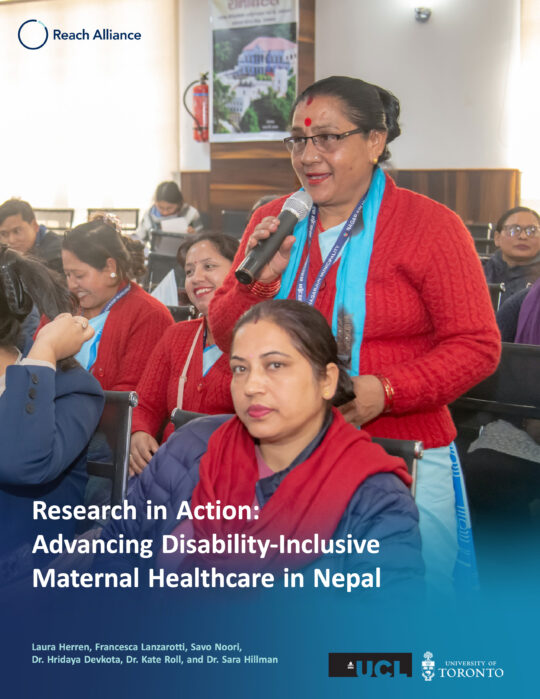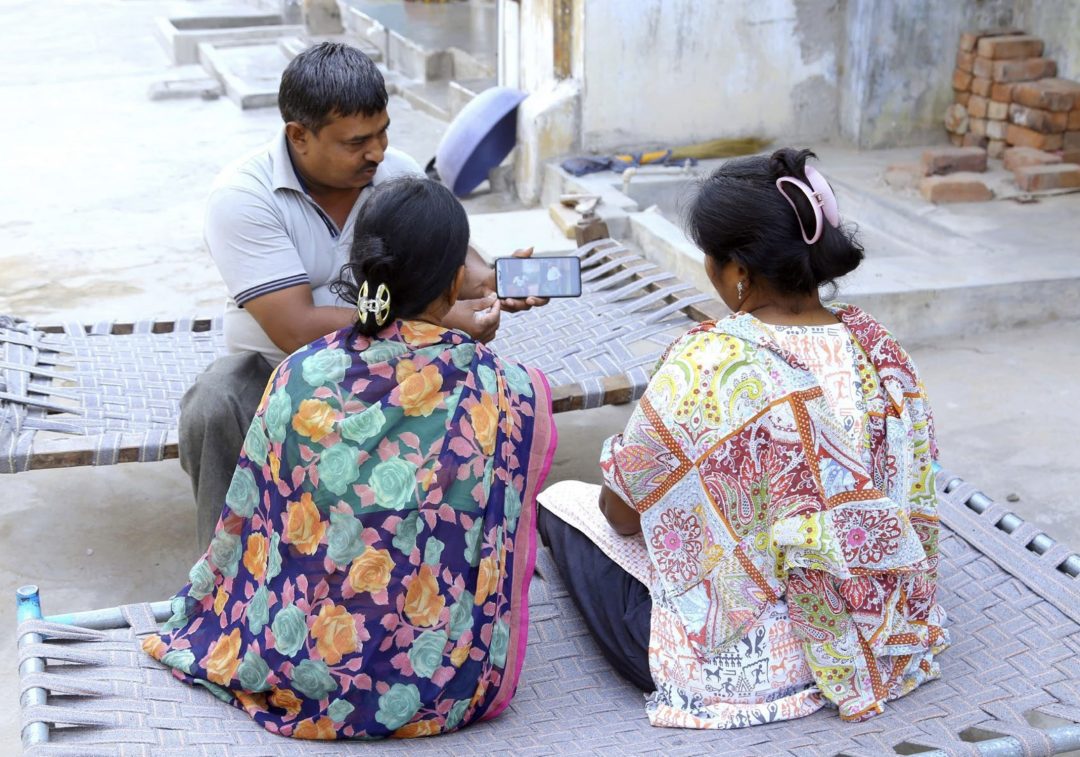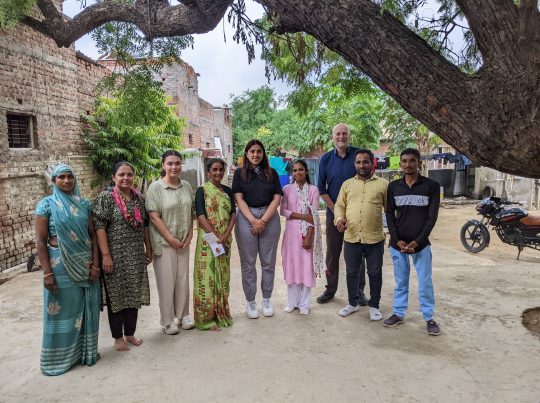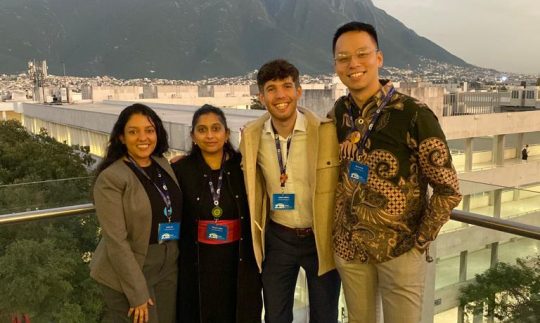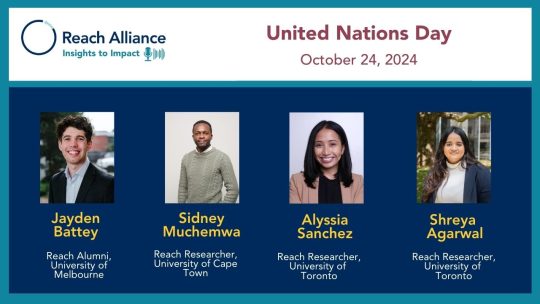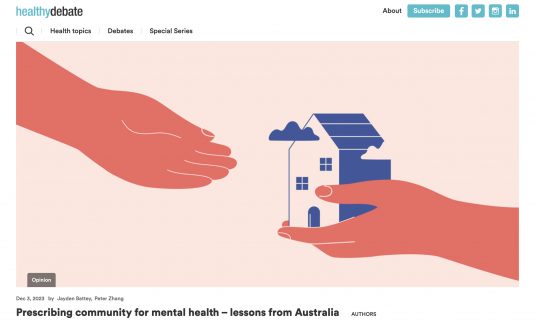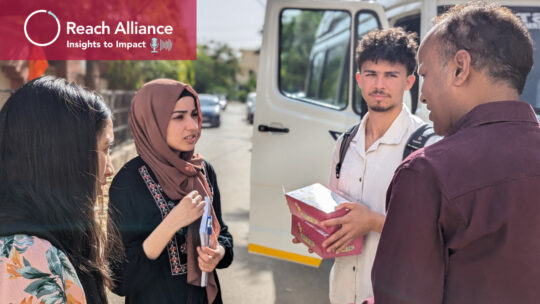Executive Summary
Mental health is a significant and growing contributor to the global burden of disease, with numerous interventions attempting to raise awareness about its importance. While many individuals receive support, a large treatment gap remains and, despite the continued efforts (and increased mental health budgets) of governments, nongovernmental organizations, and the private sector, the problem grows. Mental health conditions have no single cause or solution, and interventions face many technical and cultural barriers including lack of funding, staffing, and adequate infrastructure; stigmas and discrimination; historical trauma; social inequalities; lack of opportunity; poverty; and more. These issues are further intensified for interventions attempting to work within hard-to-reach populations, including rural communities.
To address these barriers, the Centre for Mental Health Law and Policy (CMHLP), based at the Indian Law Society, Pune, India, has developed, implemented, and evaluated Atmiyata, a community-led mental health and social care program that relies on community volunteers to identify, support, and refer people who are experiencing common and severe mental health conditions. Named by the World Health Organization (WHO) as one of 25 good practice community mental health initiatives, Atmiyata translates to “shared compassion” or “empathy” in Gujarati. Since it was founded in 2013, Atmiyata has expanded to 645 villages in Gujarat’s Mehsana district and further into eight additional rural district across India, including: Patan, Sabarkantha, Bangalore, Chandrapur, Bhatapara, Roorkee, and Darlaghat. Unlike purely clinical interventions, Atmiyata aims to address what the CMHLP describes as the “neglected” area of mental health care: a community’s capacity to build psychosocial support for individuals experiencing distress and common mental health conditions.
We investigated the initiative in Mehsana, Gujarat, to better understand how Atmiyata engages communities, and how the process of scaling may present fresh challenges in retaining quality control and monitoring, evaluation, and learning. Although Atmiyata’s intervention faces various challenges including the need for more and predictable funding, it successfully addresses the social determinants of mental health within India’s unique (and complex) sociocultural environment, including the impacts of gender, religion, and caste. This is particularly crucial for hard-to-reach populations.
Context: Mental Health in India
Mental health is a serious, worldwide public health concern that accounts for a significant burden of disease. In India, over 14.3 per cent of the total population (or over 197.3 million people) report suffering from a mental disorder. Chief among them are depressive and anxiety disorders, which affect 6.6 per cent of the population (over 91 million people).1 In the western state of Gujarat, at least 3 in every 100 people suffer from a mental disorder, although the number is likely much higher as a result of underreporting and stigma.2
Existing Mental Health Infrastructure
Government services in India have improved over the past 50 years as the Ministry of Health and Family Welfare (MoHFW) has established both national and district mental health programs. Both fully government funded, the former seeks to establish minimum healthcare service access for marginalized populations, encourage the application of mental health knowledge in general healthcare and social development, and promote community participation in mental health services. The district-level program monitors, detects, and treats mental disorders, raises awareness, and educates healthcare workers on how to identify such disorders. From a policy standpoint, the landmark National Mental Health Care Act (2017) ensures the right to equal access to these government-funded mental healthcare services, while the National Mental Health Policy (2014) takes a preventative approach by promoting good mental health.
However, these programs face multiple limitations and despite efforts to improve service accessibility and quality, only a very small proportion of people receive treatment, leaving 95 out of every 100 affected persons without formal support. Both the national and district programs use purely clinical approaches to addressing ill mental health, with psychosocial and cultural barriers largely unaddressed.
Financial restrictions and lack of adequate funding have led to poor evaluation and monitoring systems, poor training resources for healthcare professionals, and minimal hospital infrastructure. A national deficit of qualified healthcare workers, nurses, social workers, and psychiatrists is unable to meet current demand for services, with rural and remote populations disproportionately affected. Geographic and educational barriers exacerbate the issue.
How Atmiyata Fits into the Healthcare System
The World Health Organization (WHO) has a framework that recommends an optimal mix of mental healthcare services needed to tackle mental disorders. Often used as a basis for countries to organize mental healthcare services, it suggests that most mental disorders can be self-managed and treated with psychosocial care (e.g., informal community care), which is less expensive than formal or professional care. More formal infrastructure, included higher in the pyramid, is needed for only specialized cases and requires increased operational costs.
Figure 1. The WHO pyramid framework.
Atmiyata is an example of informal community care, which interacts with both self-care (by empowering individuals with evidence-based mental health practices and techniques) and more formal mental health services (through referrals). Atmiyata links people with social entitlements and raises community awareness by narrow-casting films on social determinants of mental health.
Social Determinants of Mental Health (Gender, Caste, Income)
While India is made up of various villages, cities, and states each with their own unique sociocultural contexts, it shares a set of defining social determinants that contributes to an individual’s risk of facing negative mental health conditions as well as their likelihood to seek help.
Gender disparities and patriarchy
In India, women are two to three times more likely to suffer from common mental health conditions than men, largely as a result of patriarchal structures resulting in significant stressors. Beginning in childhood and adolescence, women on average receive fewer than five years of schooling and are less likely to be financially independent compared to their male peers.3 Rigid gender roles, especially in rural areas, often define women as the primary family caretakers, resulting in diminished education opportunities and limited rights to personal autonomy and independence.
In adolescence and adulthood, violence against women is prevalent, and presents in various forms including female feticide, honour killings, dowry death, domestic violence, financial and mental abuse, human trafficking, and sexual assault. According to the WHO, one in five women are victims of rape or attempted rape. In particular, 70 per cent of married Indian women between the ages of 15 and 49 are victims of marital rape which is yet to be legally criminalized in India. Two-thirds of married Indian women experience domestic violence.4 A husband’s alcohol dependence, as well as fertility concerns and the anxiety resulting from burdensome expectations of a spouse or in-laws can also cause distress. Social blame attached to infertility, miscarriages, and the death of a husband can leave women ostracized within their communities and very vulnerable to mental health disorders.
Caste as a status hierarchy
Caste is a social construct intrinsic to Indian society which results in a rigid status hierarchy that governs an individual’s human rights, relationships and marriage, business and land ownership, and educational and occupational opportunities. Caste discrimination remains particularly prevalent in rural and remote locations where lower-caste houses might even be physically segregated from upper caste houses. Members of lower castes have lower annual wage and salary income, reduced literacy, and in some cases, reduced access to mental healthcare compared to members of upper castes.5 These inequities mean that members of lower castes are more likely to experience financial hardship and discrimination which lead to increased risk of mental disorders and distress.
Poverty and financial hardships
According to India’s most recent census, over 23.6 per cent of its population live under the benchmarked Indian poverty line, earning less than USD 1.35 a day.6 Although poverty rates are decreasing, poverty is still a significant socioeconomic determinant of mental health. For example, men earning less than one-quarter of the minimum wage are at the greatest risk of suffering from mental health disorders and are more likely to suffer from substance and alcohol abuse. This exacerbates the symptoms of mental disorders and leads to the inability to work, further financial struggles, and increased incidence of family violence.7
Household income and family violence can also influence a developing child’s mental health. For example, children facing poverty have a greater risk of developing depressive disorders as an adult because of unstable households, and bullying and discrimination from their peers. India’s poverty rates also contribute to the large proportion of malnourished children who are also at risk of intellectual and physical disabilities which further prevent social mobility, aggravating the cycle of poverty.
The COVID-19 pandemic exacerbated these issues, increasing unemployment to 24 per cent and reducing monthly earnings by 40 to 50 per cent. Despite experiencing fewer lockdown restrictions than the cities, rural communities are mostly agricultural economies and so were adversely impacted by people’s inability to sell produce, worker shortages, and reduced demand for goods.8
Relevant SDGs
Our study’s focus touches on the following UN Sustainable Development Goals.
Ensure healthy lives and promote well-being for all at all ages
Reduce inequality within and among countries
Hardest to Reach
In a complex and multifaceted country like India, defining hardest to reach is difficult. At first, one might assume that remote communities face the biggest barriers to support, but this is not always the case. Similarly, poverty certainly has a role to play, but by itself it remains an inadequate descriptor.
In Gujarat, perhaps the most helpful term is a local one, revealed by a volunteer champion during a focus group discussion. Chevada na Vyakti broadly describes the last person within a community who can access/reach the help they need. This person, or population, is different in every community, but many of the following issues can play a role:
- Rural and remote communities face geographic barriers to health services, jobs, and education, and may have insular communities that aggravate mental health stigmas and discrimination.
- The belief in superstitions and dependence on faith healers may prevent individuals from seeking appropriate mental health services and exacerbate stigmas regarding mental health.
- Close friends and relatives, because of existing stigmas, social rules of engagement, or the vulnerability required to discuss mental health with close relationships, can prevent people from discussing mental health and increase the probability of it being overlooked.
- People who engage in substance use or abuse often have underlying mental health issues and those around them can fear violence.
- Both perpetrators and victim-survivors of gender-based violence face stigma. Victims often experience a sense of shame or help-lessness and physical and mental hurt, and perpetrators often feel shame, particularly when their actions were influenced by substance use.
- Because of patriarchal structures’ influence and unequal access to opportunity, women are often exposed to violence and fear for their personal safety. They are often socially isolated and restricted from access to support.
- The influence of these same patriarchal structures can leave men reluctant to seek help for fear of appearing weak and can cause embarrassment or shame in expressing emotions.
- People from varied religions and castes face barriers in access to support, especially if no trained support workers are accessible in their own religion or caste.
There are paradoxes in these issues. How can the furthest/most remote communities and the people most closely related to you be the hardest to reach? Successful interventions must navigate these complexities in every individual case to be effective, and to ensure no person gets left behind.
Our Research
We sought to understand how Atmiyata has scaled a volunteer-supported mental health initiative to support rural and hard-to-reach people experiencing mental health conditions, and how the implementation team has dealt with issues around quality control and sustainable outcomes as they scale. Following a literature review, and with the help of local translators, we ran a series of in-person semi-structured interviews and focus group discussions with 13 staff and 32 volunteers involved in the program. Our questions focused on the personal experiences of interviewees around recruitment, training, and work; their opinions on who is the hardest to reach and how the intervention addresses their needs; their perspectives on sustainability and quality control; and their personal analysis of the strengths and challenges of the intervention. We were particularly interested in how Atmiyata engages with hard-to-reach communities.
Addressing a shortage of mental health professionals, stigma and discrimination associated with mental illness, and a lack of acceptable and affordable services, Atmiyata aims to close the existing 85 per cent treatment gap for common and severe mental health disorders, improve outcomes for people with common mental health disorders, improve people’s quality of life, and increase people’s access to social benefits.
Atmiyata is effective in reducing symptoms of common mental disorders. A randomized implementation trial in one district in the state of Gujarat found that persons who received counselling from Atmiyata volunteers were two times more likely to have recovered from a common mental health disorder after three months, and three times more likely after eight months. Further, the intervention had cost offsets due to substantial use of volunteers. From January 2018 to May 2023, Atmiyata assisted 3,930 people with severe mental health conditions in connecting to public mental health services, connected 9,788 people with social benefits and welfare schemes, and provided counselling sessions to 50,409 people with common mental health conditions.9
Atmiyata is founded on five core values: empathy, shared compassion, reaching out, connectedness, volunteerism, and participation. To keep Atmiyata running and to support the mental health of village communities, a trusted and well-connected group of people is required to uphold the program’s values.
Figure 2. Atmiyata implementation team structure.
The project managers, for example, recruit and train community facilitators (CFs), communicate and collaborate with internal and external stakeholders, conduct regular field-based quality assurance visits, and document and access the Atmiyata mobile application for monitoring and evaluation. To become a project manager, one must have three or four years of community-based experience, effective project management skills, and the ability to train and mentor community facilitators.
The next tier is community facilitators, who identify, train, mentor, and support champions, communicate with local stakeholders, visit local villages on a regular basis, and use the Atmiyata application for supervision and monitoring. Community facilitators are typically recent master of social science graduates with a locally based and in-depth understanding of language, culture, and geography. Facilitators work six days a week, Monday through Saturday, for eight hours a day in their assigned villages, conducting village mapping, holding stakeholder meetings, and working to find new champions and monitor their current ones.
Champions, as the village-based volunteers are known, are at the heart of the Atmiyata model. They are village residents who work as volunteers for at least one hour per day, have basic literacy skills, and are well-versed in their community’s culture and intricate relationships. They are chosen first through village mapping, in which community facilitators collect demographic information about the village, receive a stakeholder list from the sarpanch (village head), and identify potential champions through self-nomination, village suggestion, or observation.
Overall, it takes the facilitator two to three visits to select the champion. During these final visits, facilitators receive feedback about the likely champion from a few other people, and once background checks are completed, the champion is invited to complete a seven-day training. Over the course of three weeks, champions receive training that includes practice-based counselling sessions, exercises for learning to empathize with others, and relaxation techniques for helping individuals with anxiety. Champions are mentored and supervised every two weeks by their community facilitators, who oversee 40 to 50 champions.
Champions provide psychosocial support by identifying people in need and providing four to six counselling sessions for each one, using evidence-based techniques, referring people with severe mental illnesses to public healthcare facilities, and facilitating access to social benefits such as pension allowances, disability benefits, and unemployment benefits. Each champion uses a smartphone provided by Atmiyata through funding from Mariwala Health Initiative, Mumbai, to screen ten-minute films via the Atmiyata app about common social stressors such as unemployment, alcohol use, domestic violence, and spousal conflict to raise awareness and reduce stigma. Other funders that help support Atmiyata include Azim Premji Philanthropic Initiatives (Bengaluru, India) and Ambuja Cement Foundation (Mumbai).
The mitras, or friends, are village-based volunteers who make up the final tier. Mitras work closely with their village champion and are integrated into the village’s various subcommunities and geographies to ensure the champion’s equitable reach. In some cases, champions alone are unable to reach everyone in the village, which is where the mitras come in, acting as the champion’s eyes and ears on the ground. Champions identify and train mitras to connect those in distress with champions, who then provide additional support and counselling. Likewise, champions and mitras collaborate with existing grassroots groups, farmers’ collectives, the sarpanch, Anganwadi (rural childcare centre) workers, ASHA (Accredited Social Health Activist) workers, primary health centre staff, and trusted others in the community.
The Atmiyata app is free and comes in two versions: one for the Atmiyata team and one for the community. The app was created in-house for champions to document their work, as well as for community facilitators to monitor and supervise the champions’ work. Both versions of the app contain films, a Bluetooth feature for sharing the app, and project information. The champions’ version of the app aids in the documentation of the number and content of the four to six counselling sessions, the number of referrals made, the number of social entitlements accessed, and the number of times the four films were shown to community members. These data are accessible to the core Atmiyata team, who monitor it for continuous evaluation.
Atmiyata Works by Building Genuine Relationships
The core tenet of Atmiyata’s model is that relationships, built on mutual trust and empathy, can facilitate an environment for effectively treating distress and anxiety, especially for hard-to-reach populations. For some, the presence of these relationships can be enough to alleviate distress a person may experience. For others, the relationship is a vehicle to provide access to further support.
This people-centred approach, which leverages genuine relationships and social credibility to facilitate access, makes Atmiyata an effective intervention for people in a community who are hard to reach. Where stigma, skepticism, or lack of services might generally prevent people from accessing support, the intentional relationships built by champions create a safe, nonjudgmental environment where people want to be, and where they can freely express their experiences of distress without feeling ostracized or judged for getting help. They are personal, less formal than a medical consultation, and take place in comfortable locations and at convenient times and are free for the beneficiary.
Champions have that name for a reason. Socio-cultural norms, traditional beliefs, and perceived or actual judgment from a wider community can prevent people from seeking support. The presence of a champion in their life can bridge these gaps. When a person experiences distress, a champion has more capacity to be present, has a deeper understanding of that person’s baseline emotions, and is therefore more likely to quickly detect a mental health condition than a healthcare professional who might be constrained to seeing the client in an office, hospital, or community health centre (if at all). Relationships with champions allow a “whole of life” analysis of a person’s experience of distress, enabling responses to effectively address the lifestyle or psychosocial gaps preventing full mental health and well-being.
For example, a man with a substance use challenge may not visit a doctor, but a champion may observe his behaviour within the community, identify potential mental health issues, and begin a process of relationship building. If this man abuses his wife when he’s drunk, the champion might pick this up in conversation, allowing an opportunity for support. Even when such social barriers at first prevent a person from discussing their issues with a champion, it is the champion’s own lived experience, relationship with the wider community, and resulting deep knowledge of a community’s social dynamics, that allow them to either navigate these barriers directly, or otherwise seek help or refer to other champions. Throughout this process, Atmiyata’s deeply embedded values remain central to the champion’s approach.
Relationship-Building Challenges
It takes different lengths of time to build trusted relationships. Champions told us that women were easier to connect to, whereas it might take up to nine months of relationship-building to gain a man’s trust.
Sometimes faith healing practices, which rely on traditional beliefs and sometimes a family’s multigenerational trust in traditional healers, can make it difficult for a champion to establish their own rapport. Champions speak of long-term strategies to build a relationship with not only the distressed person, but also with their family, and religious and community leaders themselves, to counter the challenge. This process of building “social capital” — a strong reputation for trust and respect within the community — creates the confidence a community needs to see more people engaging with mental health supports. Because the champion remains present in different parts of the community, they understand diverse cultural norms and traditions, allowing them to navigate the complexities of mental health in each social context. For instance, Rukhsana, a Muslim woman, gained the respect and trust of the community through her husband’s high and respected status, and wealth from land ownership.10 As a champion, she leveraged this status to build more relationships which facilitated her access to engage with community members.
Such relationships are built not only between individuals, but in partnership with community groups and institutions such as Anganwadis (rural childcare centres). Informal partnerships (for example, by leveraging the relationships of a champion who also works at the Anganwadi, or of a friend at the village temple) helps champions identify more people in need of support and thereby build a bottom-up network.
Champions also build close relationships with their community facilitators (CFs), who play a significant role in their growth and success by offering personal and professional support. Champions told us that small acts of friendship by the CF make all the difference, for example, gifts of sweets or candy to a champion and their family during a village holiday or celebration. The CF’s friendship, camaraderie, and such integration with the champions’ families create a sense of belonging and value, fostering a strong support system within the organization.
Perhaps surprisingly, the volunteer nature of champions reinforces trust and builds social capital in a way that could be compromised if they were paid. Community champions identify their volunteer status as a strength that helps end users to trust them. They find fulfillment in saving lives and supporting the community, and consider it an honour and a blessing to serve others. The relationships they build are mutually transformative, and a deep sense of individual purpose grows as champions witness change in other people’s lives as a result of the relationships they’ve built. Champions don’t see this as a barrier to sustainability, but personally value these relationships, and hope to continue in their roles for the long term because of them.
Atmiyata’s approach to engaging hard-to-reach populations revolves around cultivating genuine and empathetic relationships with individuals and communities. Through their embedded presence, champions establish trust and engage with diverse populations, ultimately overcoming the challenges of being “hard to reach.” By respecting socio-cultural beliefs, collaborating with leaders, and fostering community involvement, Atmiyata ensures that mental health support is seamlessly integrated into the fabric of people’s lives. The organization’s dedication to building meaningful connections exemplifies how relationships can be transformative in promoting mental well-being and creating positive change within society.
Addressing Social Determinants of Health
Once relationships are built, Atmiyata’s model seeks to address the complex psychosocial conditions at play in a person’s mental well-being. Volunteers are trained in understanding the social determinants of health and the many ways these affect a person’s health. In most cases, the impact is intersectional, involving the joint influence of gender, caste, religion, socioeconomic status, opportunities for work or education, relationships, access to healthcare, connectedness within a community, and more.
One champion described the case of a married woman from an upper-caste (Rajput) family facing mental distress caused by her inability to leave a physically abusive marriage due to cultural stigma around divorce. To fully understand her distress, it was necessary to analyze her position not only as a woman but specifically as a Rajput woman — a member of a community for whom divorce is particularly stigmatized. The intersection of gender and caste exacerbated her perceived inability to improve the situation.
Champions gaining a comprehensive understanding of the social determinants of mental health has been crucial to addressing them effectively and efficiently.
Social Determinants at Work
Addressing economic factors is crucial in mitigating the impact of poverty and socioeconomic disparities on mental well-being. Many villages’ livelihood revolves around agriculture, with residents engaged in farming, harvesting, and animal rearing. Some villagers are employed by the municipal government (Gram Panchayat), while women, in addition to domestic and agricultural work, might be employed as Anganwadi and ASHA workers in the childcare and medical sectors. The prevalence of agriculture as the primary occupation exposes villagers to several challenges. They face the risk of unsuccessful harvests caused by poor weather conditions and, for those involved in rearing animals, the loss of their animals can severely reduce income. For certain marginalized castes, dependency on working on others’ land leaves many vulnerable to job insecurity because employers can terminate their services without notice or a social safety net. Such economic challenges cause distress in households, particularly affecting women who are responsible for managing expenses.
Unemployed men experience frustration and stress, which can lead to harmful coping mechanisms including substance abuse, neglecting familial responsibilities, and domestic violence. Concerned parents-in-law may increase pressure on the husband to find new work and care for his wife (and, perhaps, children). At times, husbands express this stress of unemployment through violence toward their wives. Experiences of poverty, malnutrition, and potentially the loss of education opportunities for children may follow.
A champion can engage with the husband individually after a gender-based violence incident, build a relationship, and work to uncover the layered challenges at work in his family’s life. Rather than prescribing antidepressants or anti-anxiety medication, the champion is trained to identify these social determinants, and support the end user to address them. In practice, this may involve making connections to government social benefit schemes, for example, for unemployment, providing counselling sessions to increase resilience and self-awareness, and offering emotional support and guidance to regain motivation and manage emotions effectively to work toward the man’s goal. The program’s holistic approach empowers the individual by supporting them to take practical measures that address economic hardships and their psychological impact, thus improving overall mental well-being.
As this example suggests, the impacts of social determinants of health can be complex and severe for people in rural India. Part of the legacy of colonial and patriarchal structures remains the systematic oppression of women and girls, and lower-caste communities, leading to continued sexism, casteism, discrimination, and violence. Young girls, for example, face education barriers beyond middle school as a result of the safety concerns involved in travelling to distant schools. This perpetuates financial dependency and limits job opportunities. Sociocultural norms restrict widowed women from remarriage, intensifying their mental distress and reinforcing feelings of social inferiority.
This is exemplified by the story of Tameena, a woman who faced stigma and isolation after her husband’s death, all while caring for her four young daughters. Tameena is now an Atmiyata champion who shared how her recruitment into the program proved transformative. The training aided her recovery from depression by addressing social determinants and teaching her skills to manage her own well-being.
To address social determinants, one must identify where they are at play. Atmiyata has produced four short films that depict the life experiences of individuals living in villages in the district of Mehsana. Featuring narratives about sensitive issues such as spousal conflict and gender-based violence, these films support champions and beneficiaries to recognize how social determinants might affect their own well-being.
The films are short and accessible on mobile phones, and very engaging in a “Bollywood” film style. Leveraging local people’s preference for Indian-style entertainment and movies, Atmiyata has crafted films that convey meaningful messages, rendering the learning process engaging and accessible. Their visual narratives transcend language and literacy barriers, allowing anyone to comprehend their content. Champions can spontaneously share these films at any time since they can access them on their phones. Ultimately, the films demonstrate that issues linking mental well-being and social determinants of health are not isolated, promoting a more accepting environment in which these matters can be openly discussed with champions and in society more broadly.
The films also initiate conversations among people — champions use anonymous examples to encourage individuals to talk about their own mental health concerns. The referrals and discussions not only act as remedies for existing mental distress but also serve as preventive measures, enabling early identification of mental health issues before they escalate into significant problems. This proactive approach takes strides toward bridging the gap for those who are hardest to reach, fostering a more supportive and inclusive environment for mental well-being in the village community.
Effective and Sustainable Development
Counselling
Beyond addressing social determinants of health, Atmiyata commits to fostering sustainable development through the intentional ways that champions foster self-sufficiency and lifelong lessons during counselling sessions. Rather than making beneficiaries rely on continuous access to support, champions empower participants to spread and use teachings and techniques consistently throughout their life. As a result, beneficiaries/end users can exercise agency, continue to address social determinants of mental health, and facilitate the spread of the program’s reach to even more isolated individuals. Because both champions and beneficiaries share this approach with their families and social circles, a ripple effect of greater mental health awareness and support is created.
Leveraging government supports and clinical expertise
As we mentioned earlier, the causes of mental health disorders are complex, and highly related to social, cultural, and economic factors. Herein lies another strength of Atmiyata. In addition to using their own expertise, champions actively link beneficiaries with existing government supports (e.g., disability pensions) and local medical expertise (e.g., doctors, psychologists) to ensure that beneficiaries can receive the full support needed to relieve their distress.
In doing so, champions can support more holistic interventions, and more sustainable results. One champion named Aarav recounted connecting a young girl with a nearby school to support education and opportunities, and supporting another family to purchase an auto-rickshaw (a three-wheeled vehicle often used like a taxi) to address income gaps. Other beneficiaries were connected with community healthcare centres and primary health centres. Still others intervened directly with violent husbands, offering support to address their own mental health challenges, or talking with a husband’s family members to prevent future violence, leading to safer marriages for women. By connecting with local solutions, Atmiyata champions remain flexible, innovative, and creative, supporting more harder-to-reach individuals and alleviating burdens on the existing healthcare system.
At the micro level, Atmiyata succeeds in identifying and addressing mental ill health in individuals. However, it is their efforts to coordinate, train, and empower a larger network of local, community-based capacity that is the organization’s primary strength in engaging with hard-to-reach populations. While one single champion might reasonably support a population of up to 1,000 people, the Centre for Mental Health Law and Policy (CMHLP) now employs a team of 16 community facilitators in each district in Gujarat, covering about 550 villages, each coordinating up to 50 champions — and each champion may direct up to 10 mitras. This tiered management approach has several benefits, including embedding sustainability and accountability, minimizing risk, and providing opportunities for broader and deeper engagement with minority communities.
The network of champions can be likened to a web of trained, interconnected volunteers. As more champions are recruited, the web expands, and the chance of detecting and supporting community members increases. The more diverse the volunteers, the higher the incidence is of successful identification as champions engage with different castes, faith communities, families, and geographic areas.
Central to achieving this local capacity is the role of community facilitators (CF), who are hired to engage with their own community. CFs fulfill three key purposes at the local level: ensuring effectiveness, promoting sustainability, and enabling scale.
Effectiveness
In India’s complex social and physical environment, the intersection of caste, religion, education, socioeconomic status, gender norms, family dynamics, and substance use can all act as barriers to accessing health support. A skilled CF can dramatically reduce the impact of these barriers at the local level.
Tangibly, this begins with the process of ethnographic mapping. When Atmiyata launches in a new region, the CF (usually a local person living within the region) undertakes an extensive research process, visually representing a community’s geography, rhythms and cultural norms, social hierarchies, events, meeting places, and history. Although it’s time consuming, this process lays the foundation for successful implementation, and allows program staff to make strategic decisions about how to nuance the intervention for a particular community. The premise is simple: Atmiyata is built on relationships, social capital, and the ability to understand and address social determinants of mental health. Because each community is unique, any inaccurate or surface-level-only understanding of the community may result in ineffective intervention.
If mapping is the first phase of a CF’s role, then stakeholder mapping and identifying champions is the second. To ensure successful program launch, CFs recruit a diverse group of champions with existing influence and social permission to engage with different parts of the community. Willing volunteers can be hard to come by, so CFs use their own experiences, education, local knowledge, and even existing relationships to find the right people. One CF, for example, explained how they locate every formal and informal leader within a community and ask them to identify the most respected people within their community. Certain names appear time and again so these are the people to approach about becoming champions.
Table 2. Role of community facilitators in building community-based capacity.
Once identified, CFs train, monitor, mentor, and evaluate champions to ensure their early and continued success. Importantly, consistent data are tracked daily to monitor impact, and identify potential issues. Early success is critical to the perceived legitimacy of the program within a new community, so inconsistent early performance may create additional barriers for future engagement by people experiencing mental health challenges. As we discuss later, Atmiyata’s training is based on role-plays and practice-based approaches to facilitate comprehensive skills-building, which mitigates this risk.
Sustainability
Once a champion is successfully chosen and trained, a CF’s role becomes more focused on sustainability. Providing continued training, maintaining momentum, and ensuring volunteer retention are all ongoing challenges. However, each is necessary for the intervention to continue. Of course, success begets future success as social credibility grows and more community members engage with champions. Relationships are deepened, and CFs support champions to take active roles in facilitating this process, ultimately leading to increased program uptake in existing and new communities. Ultimately, increased uptake means increased reach.
Scale
Finally, CFs support Atmiyata’s capacity to scale. At the operational level, as CFs successfully mentor champions to grow in their operational and management capabilities, mitras can be recruited, deepening engagement within local communities. More broadly, CFs have the skills to design local growth strategies, and facilitate expansion into new communities. They must be locally based, with a deep understanding of language, culture, and geography. However, as Atmiyata executives point out, CFs are the backbone of successful scaling, and provide a framework within which localization can occur.
Ensuring Quality Control: Capacity Building
Atmiyata’s robust training program is embedded throughout every level of the organization. Training is highly regarded, so much so that an entire full-time senior role is dedicated to maintaining its quality and relevance. The impact is clear: in interviews with senior executives, middle management, and community volunteers, the conversation always drifted to training. During focus group discussions, we observed champions practising the relaxation skills they’d learned during training to calm their nerves.
Every research participant cited their training as fundamental in their own development, beneficial for their own well-being, and vital for equipping them to succeed in their roles. Community facilitators consistently reported in-house training was more important for their work than their master’s-level education.
Although roles require some specialization, Atmiyata maintains a consistent foundation-level training that each staff member and volunteer must complete. Underpinned by a detailed training manual, this embeds Atmiyata’s values, evidence-based framework, and collaboration and active learning for every person. The training is collaborative, conversational, and intentional: everything matters — from the way learners are positioned in the room (a circle with no gaps to ensure maximum inclusion) to the balance of talking between facilitator and learner (not too much, not too little of either).
According to senior leaders within CMHLP, central to the training’s success is its “animation technique.” Far from a simple process of knowledge transfer and testing, Atmiyata’s facilitators use group discussion, role play, reflection, and practice to entrench skills transfer and learning. Sessions are paced across several weeks to allow space for individual reflection and processing. Resources are developed in multiple languages and dialects to maintain cultural relevance. And even in the training room, relationships are maximized: project managers train their own CF; CFs train their champions; champions train their mitras.
This approach decentralizes the role of training. All staff and volunteers are trained in Atmiyata’s history, context, and techniques and they are taught how to train others, ensuring every person’s capability has grown to a sufficient level. High minimum standards, comprehensive evaluation, and senior manager approval must be met before a learner can “graduate” to trainer level, and senior staff do not hesitate to fail a learner before they can apply their skills in their work. For example, senior staff shared an anecdote about one cohort of learners where approximately 60 per cent of learners did not pass and had to undertake retraining.
The seriousness of training makes sense when considering the diversity of staff and volunteers, and the complex environments they work within. Champions have diverse education backgrounds, literacy levels, and languages. High training standards are therefore fundamental to maintaining the intervention’s quality control and consistency across geographic areas, growing credibility of the program, and reducing the risk of information attrition if any staff or volunteers were to leave. Further, the collaborative, values-based, and relational standard of training mirrors for participants the same approach they should use in implementing the intervention in their daily work.
Sustaining Growth and Development
Funding
For volunteer-reliant interventions such as Atmiyata, challenges involved with sustaining operations, growing impact, and continuing to function well loom large. The process of scaling is a challenge — not for lack of talent or ideas, but rather for the need for additional financial capital to support the process. As one senior manager reported, “we know what we need to do. Ideas are not our problem. It’s funding the ideas that remains a challenge.”
The organization receives philanthropic and grants support but finds the philanthropic sector challenging. Grant funding often carries significant additional administrative and reporting burdens, and may enforce additional responsibilities. They can also be unpredictable, with no guarantees of funding three, five, or ten years into the future. Individual philanthropists may also be unpredictable, for example, choosing to invest their funds elsewhere in future. Continued communication and strong relationship building are key to managing these, along with the financial viability of the intervention.
Further complicating factors include restrictions for Indian organizations wanting to receive international funds, and the increased burden of regulation and compliance. While monitoring and evaluation are crucial to the model’s design (champions are required to report almost everything they do), embedding this across rural populations, multiple languages, and with volunteers with diverse levels of literacy and diverse socio-cultural contexts is a challenge.
Even so, Atmiyata has scaled. Once an isolated intervention, the program now supports tens of thousands of people across many states, and the team talks of further opportunities to grow. Clearly, strong training practices have been essential to this process. However, Atmiyata has also used technology to support sustainability and expansion.
Technology
After using paper and manual processes for years, Atmiyata embarked on an application development program in the past 24 months. Although a long and complicated process, the app is now used by champions across the country for everyday reporting. Champions were generally positive about the app, saying it was “easy to use,” “more efficient,” and “convenient.” In addition to every champion receiving a mobile phone, now the app is part of the resource package provided to support their work.
The app is a strong example of more streamlined and automated systems being embedded across the organization, reducing manual processes, increasing transparency, and supporting senior managers to make decisions about resource allocation, future goals, or predicted need in a geographic area. It also highlights the importance of continued monitoring and evaluation to support Atmiyata’s objectives, including managing remote staff, quality control, reporting for grant and philanthropic funding, and ensuring the program continues to be relevant to each community.
Recruitment
Growth requires more people, and Atmiyata’s team has grown significantly since the intervention’s inception. From a sustainability perspective, recruiting the right people is essential to longevity, quality control, program consistency, organizational credibility, and workplace culture. And yet, according CMHLP staff, for an NGO working with hard-to-reach communities and with no dedicated human resources capacity, and with complex, multidimensional roles working autonomously across a large geographic area, staff recruitment and retention are a challenge.
Atmiyata continually navigates these challenges, especially in the aftermath of COVID-19. One solution involves internal promotions. As the number of mitras and champions grows, so does the pool of well-trained candidates for community facilitator roles. The CFs create a pool of project managers. These employment pathways are slowly becoming a steady solution to the hiring challenge. Additional solutions have included increasing salaries, advertising widely about available positions, and providing high levels of training and support to reduce staff attrition. However, CFs remain difficult to recruit: although the roles are rewarding, they are complex, require masters-degree-level training, and involve more travel than other comparable roles working in government or industry. Furthermore, they require exceptional community relationship-building skills, and need to see the community not as a passive recipient of care but as a vital partner with active involvement in building sustainable solutions for mental health and social care.
Scaling through partnerships
Using partnerships with like-minded NGOs to scale across the country is another solution. In these circumstances, CMHLP can provide their proven model, training, resources, and digital infrastructure to see their program implemented by other organizations. This may facilitate more speed, but also carries risk: CMHLP may have less control, transparency, or insight into the daily operations of the program being carried out by another organization. However, partnerships reduce the need for Atmiyata to scale at the speed of only their own financial capacity, allowing them to reach more communities faster.
Lessons Learned
Atmiyata’s community-led intervention has implications for global development practice, with insights that can be applied to projects in different geographic and cultural contexts. For programs seeking to address ill health and engage with hard-to-reach communities on the pathway to sustainable development, Atmiyata demonstrates that:
- If you’re going to work with marginalized communities, building long-term, genuine relationships is the best way to overcome stigma and create trust: Relationships are the core of Atmiyata’s model. Leveraging the trust from long-term relationships enables community champions to effectively identify and address mental health challenges in community members. Because stigmatized individuals often experience disrespect and alienation, a sense of friendship allows a beneficiary to open up about their life, making the champion’s advice and support more likely to be heard and acted upon. Atmiyata embeds this experience in their model. For example, in training sessions, everyone sits on the floor in a circle to promote trust and empathy. Leaders are hired from their local community. Local staff can leverage their understanding and connection to the community to deepen trust with residents.
- To address mental health, it’s vital to consider how a person’s circumstances and relationships impact their well-being: Numerous factors, including cultural, economic, and social contexts, contribute to feelings of distress and adversely affect mental health. To enhance well-being, initiatives must prioritize psychosocial support and address the social determinants of health that strengthen community bonds and relationships, including education, social inclusion and nondiscrimination, and access to affordable health services. Achieving a deeper understanding of the root causes underlying these challenges is essential for implementing long-term, self-sustaining solutions in addition to clinical interventions. Empathy and sensitivity are essential when addressing the complexity of situations marked by intersectionality. Addressing these issues comprehensively will lead to more effective strategies that promote mental health and resilience among affected individuals, recognizing the multifaceted nature of their experiences and circumstances.
- To address nuanced challenges for different communities, interventions must be creative, flexible, and able to adapt: Each community is different so addressing specific challenges requires creative thinking. What works in one area may not work in another. In India, leveraging Bollywood-style films has proven to be an innovative approach for showcasing the issues at hand, allowing people to connect emotionally through visual narratives. Films, as opposed to traditional brochures, have proven to be more comprehensible and discreet, thus facilitating the maintenance of confidentiality — a crucial consideration in combatting stigma. However, technology use has presented its own set of challenges. Some volunteers are more comfortable than others using mobile applications to log results, which emphasizes the need to find context-specific solutions. Another example of creativity in interventions is the involvement of local champions, such as Aarav, who support families in acquiring income-generating resources like tuk-tuks to address multifaceted challenges, including low education levels, stigma, and complex family dynamics.
- A significant barrier to long-term sustainability is short-term, grant-based funding: Grants often come with limited durations and specific project scopes, making it challenging for organizations like Atmiyata to plan for sustained impact. The cycle of constantly seeking new funding can divert resources from program implementation and building enduring community relationships. To overcome this barrier, there is a pressing need for a shift in funding models toward more stable, long-term investments that empower organizations like Atmiyata to address complex issues, foster community trust, and achieve lasting improvements in the lives of those they serve.
Limitations
Contextual Limitations
Operating in rural villages in India comes with its own set of contextual challenges, typically regarding gender, religion, and caste dynamics. Interactions between men and women outside the purposes of marriage and family-related gatherings is not socially acceptable, especially in conservative villages. This can create obstacles for male champions in conducting individual consultations with female end users, and vice versa, not only due to resistance from the women’s husbands, but also because of their perceived lack of understanding and relatability to the major issues that women face which primarily revolve around fertility concerns and domestic violence. Likewise, gender norms create obstacles for female champions in reaching out to and gaining the trust of male end users because of concerns surrounding being misconstrued as having an extramarital affair or romantic involvements. Female champions and community facilitators tend to have greater concerns regarding their personal safety and are often pressured by their husband and/or husband’s family to leave their jobs.
Caste dynamics do not permit individuals from different castes to socially interact with each other, making it difficult for champions to reach out to end users from different castes, who are also concerned about their personal privacy and confidentiality. Religion also plays an essential role in influencing many social practices in India. This leads to many end users associating their mental health issues with supernatural sources, leading to them resisting help from champions and instead seeking help from Indigenous healers. India’s diversity also results in varying cultural norms, traditions, and social practices between different villages, so organizations require a nuanced approach when implementing interventions tackling mental health.
Funding and Technical Limitations
Although Atmiyata does not appear to have a high staff or volunteer attrition rate, there are common reasons for employees leaving. For community facilitators, the main reasons are migration, lack of job security or permanence, and the lack of benefits such as maternity/paternity leave, greater pay, and medical insurance which are often available in government jobs. Atmiyata champions can also have varying opinions regarding the concept of volunteerism, leading to challenges in recruiting champions and convincing them to work without payment, especially in poorer communities.
In these poorer communities, some end users do not see the value in receiving support, assuming that monetary assistance alone will resolve their problems. To address this concern, consistent engagement by champions builds credibility and deepens relationships, which in time provides a platform to support personal growth. Many Atmiyata champions find scheduling session times challenging, especially for end users with time constraints and those with families who oppose their services, resulting in end users discontinuing ongoing sessions.
Conclusion
As the global discourse on mental health evolves, it is imperative to harness the power of community engagement, cultural sensitivity, and adaptable strategies to address the complex challenges posed by mental health issues. As one champion put it in such a profound way, “Without Atmiyata in our hearts and in our community, people would not talk about their feelings: people would be in tension; people would not share their tension and distress; and people would not be happy.”
Acknowledgments
We thank the Reach Alliance, Adrian Little, and the University of Melbourne, Kindred (Steve Fisher, Kirsty McKellar, Maria Rodrigues), Rojin Rahmati, and Jacqueline Larson (University of Toronto) for their support throughout this project. We offer a special thanks to the Centre for Mental Health Law and Policy (CMHLP) based at the Indian Law Society in Pune, India, and their team who have made this research possible: Jasmine Kahla, Kaustubh Joag, Nitish Narkhedkar, Palak Korde, Mitesh Prajapati, and Manisha Shastri. In particular, we thank and honour the work of the hundreds of volunteer champions supporting India’s hard-to-reach populations with access to mental health support. This research project, including fieldwork, was vetted and received approval by the Ethics Review Committee of the University of Melbourne.
MASTERCARD CENTER FOR INCLUSIVE GROWTH
The Center for Inclusive Growth advances equitable and sustainable economic growth and financial inclusion around the world. The Center leverages the company’s core assets and competencies, including data insights, expertise, and technology, while administering the philanthropic Mastercard Impact Fund, to produce independent research, scale global programs, and empower a community of thinkers, leaders, and doers on the front lines of inclusive growth.
MUNK SCHOOL OF GLOBAL AFFAIRS & PUBLIC POLICY
The Munk School of Global Affairs & Public Policy at the University of Toronto brings together passionate researchers, experts, and students to address the needs of a rapidly changing world. Through innovative teaching, collaborative research, and robust public dialogue and debate, we are shaping the next generation of leaders to tackle our most pressing global and domestic challenges.




